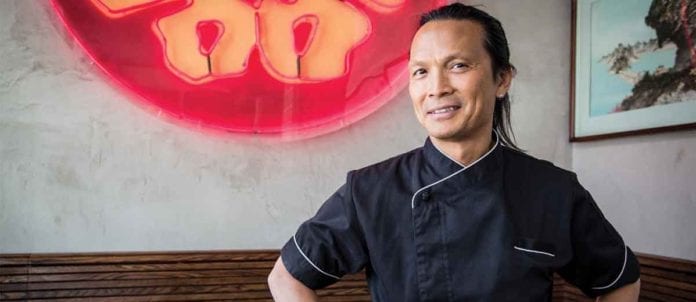Susur Lee, chef and owner of Lee restaurant, Bent, Luckee, Lee Kitchen and the newly launched Fring’s, opens up about his meteoric rise to culinary fame in this excerpt from F&H’s Icons and Innovators breakfast series.
Rosanna Caira: What was the ‘aha!’ moment when you knew you wanted to cook?
Susur Lee: I knew I had a skill. While I was cooking in Hong Kong, I realized that my work could really go international. I loved cooking and knew my skill could make me a living, provide for my girlfriend and pay rent. So [cooking] became the only thing for me — there was no other mission. I remember my mom saying to me when I was a kid “When you look for a job, since you’re not good in school, make sure you find somewhere that can feed you.”
RC: Who were your early influencers — people who made an impact on you?
SL: My friend who worked at Lindey’s, a Jewish restaurant [in Hong Kong]. I went to visit him and he said ‘I want you to try this potato apple pancake’ — it’s actually latke, which I learned after moving to Toronto. I never cooked when I was a kid, I just loved eating, but I went home that day, turned on the wok, put some oil in it and decided I was going to make latkes. I put the latke on the wok and it started to smoke up the whole house, because the wok is so thin you can never make a potato pancake in it. That day I learned an important lesson about being a chef — you have to know your tools. It’s not just about creating something. From the thickness of pots and pans to the right utensils, those are foundations I learned thanks to my friend.
RC: When you opened Lotus it became one of the top restaurants in Canada. What were you trying to create with that restaurant?
SL: Before [I opened Lotus] I was working for other restaurants but found it boring, cooking the same dish over and over again. I said to myself, when I have my own business I can do whatever I want. So it was about freedom for me — freedom of my own expression of the things I love to do. With Lotus, I felt for the first time like I could do the things I wanted to do, experiment, make mistakes and also repeat the same mistakes and make it better. I would say Lotus was my studio during that time.
RC: Opening a restaurant like that must have been a huge financial undertaking. How
did you do it?
SL: When I first came to Canada, there was only one mission — to work and save money. So at first I rented the space and saved — I grew up in a very humble family so saving came very naturally to me. As the business grew, I borrowed money from the bank, which was really risky, especially since I hadn’t established myself yet. But I didn’t think about the risks — if I failed I was still me, I still had a skill. It was just me and my wife at the time so I had nothing to lose.
RC: Was it hard to get people turned on to something that was so different at the time?
SL: Not at all. Canadians are the most open-minded when it comes to food. If you’re talking early days, everybody was still a new immigrant and really supportive of new things. When I was doing new things, I didn’t think of it as doing new things — just something I put together from the East and learned from the West. After, the writers called it ‘fusion food’; that gave me a guide and I started to focus more on that [fusion] concept.
RC: In terms of corporate culture, how difficult is it to achieve what you want when you have more than one restaurant?
SL: When I worked for myself I didn’t have too many meetings, I just told people what to do. Now I employ quite a few people and they have to understand what I’m thinking, but still be creative. I always tell them even bad ideas are good ideas. For me, running a business is 60 per cent creativity and 40 per cent corporate. Corporate provides the foundation of consistency, standards and discipline. Coming from the old-school mentality — and I would never lose that — there has to be mutual respect between the front- and back-of-house. What the kitchen creates the front has to sell — it has to have a cycle. My chefs have always been very kind, very stern and hardworking and over the last 10 years many have become successful restaurateurs and chefs. They are happy, free and independent —that’s one achievement I really feel good about.
RC: Recently the issue of sexual harassment in restaurants has made headlines. How do you deal with that in your restaurant?
SL: I have always been very strict about that from day one. Not only about sexual harassment but also drinking and drugs — those things will make a restaurant fail. I always remind my staff that they are professionals and I want them to act like one. You want to be a chef; act it. I have cameras [in my restaurants] but it’s not about watching you and what you do; it’s about keeping everyone safe. Friendly reminders have always worked in my restaurant. You have to [be a father figure] because you are protecting your business and those kind of things are very contagious.
RC: How has your relationship with food evolved over the years?
SL: Well, it’s called discovery for me. When I was as a kid and you put a bunch of toys on the table next to a plate of food, I would go for the food first. I was born with that — the motivation, excitement and, of course, the culture, because I live both [Asian and Canadian]. I have travelled to so many different places — I make special trips to visit chefs because it’s so great to see their specialties, to be exposed to what they do, what are they thinking, not just about making that plate but about how they see food. I am still finding myself every day. I’m learning — I’m still a student.
RC: Your dishes are complex. How do you convey that to people who have to execute them in the kitchen?
SL: It’s very easy for me to teach them. It’s like a bee and honey —when I put the honey down the bee comes in and they start learning. It’s easy to teach people if they love something. I’ve had chefs come into my kitchen and say they have 10 years’ experience but when you see them cooking, you can see they don’t have the love and when you try to teach them, they don’t get it. I can inspire my staff because I still love what I do; I’m still bringing things to my kitchen to share with them and showing them new exciting things. I bring the experience to them and then I share the experience with my guests. I am lucky to have staff who have helped make me successful.
RC: What are today’s biggest food trends?
SL: It’s hard for me to say because I don’t really follow trends. I just do the things I do and create what I create. But I do see a trend I call ‘lazy eating,’ with lots of flavours. What that means is everything is mashed into the sandwich or everything in one bite with lots of flavour and lots of sauces. Things can be very random — the food doesn’t even make sense — but people like it. There is so much of that kind of thing that food becomes secondary. Personality is the thing they really want to draw attention to and ultimately, there are many great chefs doing this style of food and it works for them. But it doesn’t last. It doesn’t have a memory where people say ‘I want to go back to that.’ It doesn’t really stick in their minds.
RC: Today’s millennials are health conscious and chefs are under pressure to have nutritional labelling on certain dishes. Where do you think that trend is going?
SL: There is so much information out there so people can really understand where the product comes from. Shows like Master Chef Canada teach the audience about nutritional value and the healthiest ways to cook food — those things are great for the younger generation that wants to eat healthier, better quality food and know a lot [about nutrition] so they can tweet about it. I believe healthy eating is going to become a little bit simpler — there are so
many choices and people want to go back to simplicity and comfort foods.
RC: Does the local food trend impact how you cook? Do you buy locally or from outside of Canada?
SL: Buying local is great but my food is from the East and West so I can’t do everything local. I’m happy we live in a country where we can have ingredients shipped from Thailand or Vietnam but still get things such as dairy, locally. For example, I get the thinnest rice paper brought in from Vietnam and it’s so thin you don’t have to dip it in water — that’s a really great thing. Things have been improved by innovations from other countries; products have improved because the education is getting so high. It’s great to explore that as a chef and be able to offer diners new food inspiration and an interest in learning about new ingredients.
RC: As creative as you are, and every chef wants to be, at the end of the day the restaurant is a business and has to make money. What business lessons have you learned during your career?
SL: As a businessman, you can’t stop when something isn’t working. If there is failure, it doesn’t matter, you can just open another [restaurant]; it means you have another opportunity to start a new business. For me, opening a restaurant is about time and place — the sun and moon have to line up. Especially if it’s not a cookie-cutter restaurant but a new concept. Finally, your staff has to understand the concept and how to promote it. I am not good with numbers but I understand one thing about restaurants — waste. Where is the waste happening? It can be as simple as kitchen staff or front-of-the-house wasting napkins. It might sound like you’re nickel-and-diming, but it’s not just about money, it’s also not good for the Earth so education is important.
RC: How would you describe your television experience? Has it changed your day-to-day business?
SL: I don’t like doing a cooking show by myself; I never had that personality. I enjoy doing shows like Master Chef Asia and Chopped Canada, where I can help inspire other chefs. I learn a lot of different techniques from [the contestants], too. On the last season of Chopped Canada, for example, a contestant was using scotch bonnets with sour cream — it was the best thing, you should try it — so of course I shared that experience with my kitchen. It creates a cycle of inspiration.
RC: You and your children work together and your wife is involved in designing your restaurants. How has this impacted your relationship with them?
SL: My wife is really tough, in a good way, when it comes to design ideas. We’re both good at different things and you have to leave somebody that is good at what they do alone to do it. But, at the same time, it’s important to share ideas. You may be working together and business is one thing but family is so important. I try to ensure our relationship doesn’t suffer because of work.
RC: When you look at how your sons run the business, do you see a lot of you in them or do they approach the business differently?
SL: I like the fact they say ‘Dad, I want to talk to you about this.’ It means they need my advice and I love that. Sometimes, they do it their way and that’s great — even when I don’t agree. We have a family unit when working together in the business and I think it’s important to show your staff that you have a strong unit that can’t be damaged.
RC: You recently opened a new restaurant with Toronto hip hop artist Drake. Is that your concept or your son’s?
SL: That’s more my son. I planned the menu and he said ‘I don’t like this, take that off; I don’t like the writing, you should put that in’ and I’d say okay — that’s my job. After so many years of working with me, I wanted to see, when they do things on their own, what is the right and wrong way for them? What is beautiful for them, what is successful for them, how they run with the staff or how they organize things. I did remind my son that training costs a lot of money so my staff that worked at Lee have become some of the managers at Fring’s. I remember listening to my son telling the staff we hired ‘This is a business, you’re not coming to party with Drake. Let’s be professional.’ They understand the mentality of being in hospitality; it’s a professional job.
RC: You have been in the business for a long time. But it sounds like you’re constantly learning and are still passionate about the business. How do you get inspired to innovate these days?
SL: I get up in the morning and think about what I saw in my kitchen — certain dishes that I feel could be better, even though it has been on the menu for a few months, and I start working on that dish. Then I talk to my chef, order certain ingredients and start to rebuild that dish. Inspiration doesn’t have to be brought in from the sky or be new, you can work with something that is already there, recreate it and bring something new in again. For me, recreating something provides really big inspiration every day. Then, when I start travelling, I start to think about new dishes. I love doing promotions such as the oysters four different ways at Bent or the seafood promotion during TIFF. Those are the things I like to create to get the chef inspired.
RC: Do you change your menus often?
SL: I do specials a lot. I think it’s important to keep your kitchen and your staff fresh in order to have a healthy business. But I also want to make sure I have dishes that people always love and keep coming back for.
RC: How do you define leadership? What makes a good leader today?
SL: I recently had a great talk with my son about the word compassion and understanding your staff. When you have bad things happen, or make a mistake, it’s not because you were purposely making a mistake, it’s because you didn’t know. I always remind him that you have to give people chances, to make them feel they are taken seriously before they will take you seriously. For them to have a healthy working relationship, that leadership has to be based on understanding how that person feels. Find out what’s going on. Talk to them like a person. Humour them and challenge them. At the same time, you have to be stern and understand how not to cross that line. I always tell my chef ‘I am going to provide you with every single thing you need, so please do a good job.’ Most of the time, I told my son, it’s not about what your boss thinks of you, it’s what the employees think of you that makes you a good leader. Hospitality is a team effort.
RC: What makes for good service?
SL: I tell my staff they have to be humble and kind at the same time and have good information. It has to come naturally — you have to speak from the heart. Good service is about really great knowledge, especially when you have food that is less common. You have to tell people, this food has this ingredient and texture. But you don’t want to bore them, either. You have to give them direct information, then you move on — people don’t have much patience these days.


















